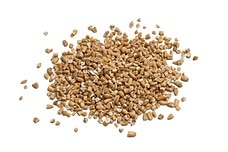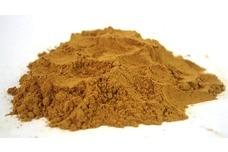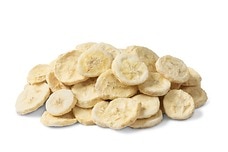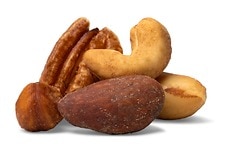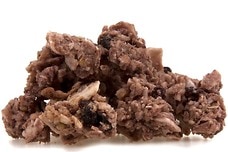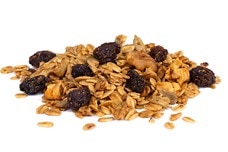Healthy Breakfast Ideas
As the first meal you eat in the morning, breakfast sets the tone for the rest of your day. Despite this, an estimated 31 million people skip breakfast every morning (NPD, 2011), with most saying they are too busy or just do not feel hungry. Coming up with convenient, healthy breakfast ideas can help you increase your energy intake early in the day.
Why Is Breakfast So Important?
People sometimes mistakenly believe that skipping breakfast is a good way to cut extra calories from their diet. Unfortunately, this plan often backfires. Scientific research suggests that successful dieters are significantly more likely to eat breakfast than those who fail to lose weight (Wyatt, 2002). Indeed, a dietary intervention performed with obese women found that eating a high-calorie breakfast was associated with greater weight loss than eating an equivalent amount of calories at dinner (Jakubowicz, Barnea, Wainstein, & Frey, 2013).
So what makes breakfast so important? One reason that breakfast is a critical meal is that it jumpstarts your metabolism in the morning. The amount of time that passes between dinner and the first meal of the morning is the longest your body typically goes without food. Eating right away provides your body with energy that impacts your metabolism for the rest of the day (Consumer Reports, 2015). Additionally, people who skip breakfast tend to have increased levels of ghrelin, a hormone that has been associated with hunger. This may cause you to feel hungrier later in the morning, leading to overeating or an energy crash.
Components of a Healthy Breakfast
Of course, not all breakfasts are created equal. Crafting a healthy breakfast requires an eye for portion size and nutrient balance. The key is to get a good balance of carbohydrates and lean protein. Carbohydrates are the molecules that your body uses for energy (MacMillan, 2015). Eating carbohydrates in the morning gives your body an energy boost, providing you with easily digestible nutrients. Meanwhile, eating protein tends to increase your satiety after a meal. Getting enough protein can also stabilize your blood sugar, preventing a crash in blood glucose levels that leads to mid-morning cravings.
Although carbohydrates are an important part of breakfast, not all carbs are created equal. For instance, a doughnut is high in carbohydrates, mostly in the form of simple carbs such as sugar. Eating a large portion of simple carbohydrates causes your blood glucose levels to rise suddenly and fall quickly. In contrast, complex carbohydrates provide a more sustained source of energy (American Diabetes Association, 2015). Additionally, many whole grain foods that are high in complex carbohydrates also contain dietary fiber. Dietary fiber promotes digestive regularity and blood glucose stability.
Healthy Breakfast Ideas
A healthy breakfast is a simple formula: complex carbohydrates plus protein plus fruit. Regarding complex carbohydrates, consider making steel cut oats, buckwheat pancakes, whole-grain toast, bran cereal, oat bran muffins, or muesli. Then, add a source of protein. This could be eggs, yogurt, a glass of milk, a protein smoothie, peanut or almond butter, or cottage cheese. Finally, add a piece of fruit to round out your meal. Most fruits naturally contain fiber, which helps to increase satiety and promote healthy cholesterol levels (American Diabetes Association, 2015). Plus, fruits contain few calories for their size, keeping you full for longer.
If you are the type of person who skips breakfast because you are too busy, also consider convenience when choosing your meal. For instance, making a serving of steel cut oats the night before cuts back on the time spent cooking in the morning. If that is still too much effort, a cup of Greek yogurt with an apple or banana can be enough to get your body going.
When planning your breakfast, also keep in mind the beverages you drink. A glass of milk is a good choice, as one cup of nonfat milk contains 8 grams of protein and no added sugars (although milk does naturally contain the sugar lactose) (Self Nutrition Data, 2015). Drinking green tea with breakfast can be another healthy choice, as this drink has been shown to promote weight loss (Hursel, Viechtbauer, & Westerterp-Plantenga, 2009). Although fruit juice can be tempting, make sure you find a brand that contains 100% juice. Many fruit juices contain added sugars that can cause your blood sugar levels to spike.
Staying Healthy While Dining Out
Dining out for breakfast presents a particular type of challenge. Many restaurants serve breakfast and brunch foods that tip the scales at 800 or more calories. Anything topped with whipped cream or served with a pile of home fries is likely to be on the unhealthy end of the spectrum.
However, you can still enjoy eating out while sticking to your healthy breakfast principles. For instance, if you are on the go, Starbucks makes protein-rich bistro boxes that contain fruit, a hard-boiled egg, multigrain bread, and peanut butter (Ansel, 2014). If you are at a diner or sit-down restaurant, look for a breakfast sandwich. Eating an egg on a English muffin can be a healthy choice, particularly if the sandwich includes avocado, spinach, or other vegetables. An omelet is another good choice, as you can ask your server to swap the whole eggs for egg whites to reduce your saturated fat intake. If your desired breakfast is served with an unhealthy side, ask if you can swap it for fresh fruit or a cup of cottage cheese.
Healthy Breakfast Recipes
A few samples of our favorite breakfast recipes are included below, but for a more comprehensive list- we encourage you to check out our breakfast recipes page.
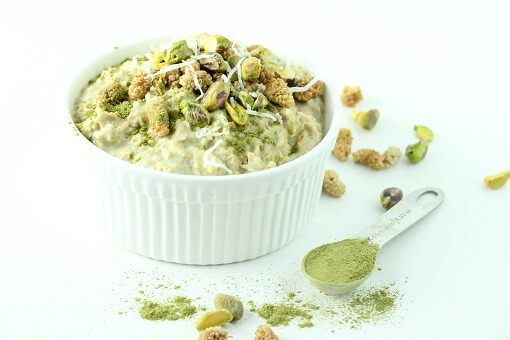
Moringa Oatmeal Recipe
Moringa in the morning is a surprisingly satisfying way to start the day. Enjoy this wholly wholesome oatmeal dish for enduring energy and a nutritious dish that keeps your diet on point!
Ingredients: Gluten-free rolled oats, almond milk, agave or maple syrup, vanilla extract, moringa powder, pistachios, dried mulberries, unsweetened shredded coconut, chia seeds.
Total Time: 10 minutes
| Yield: 4 servings
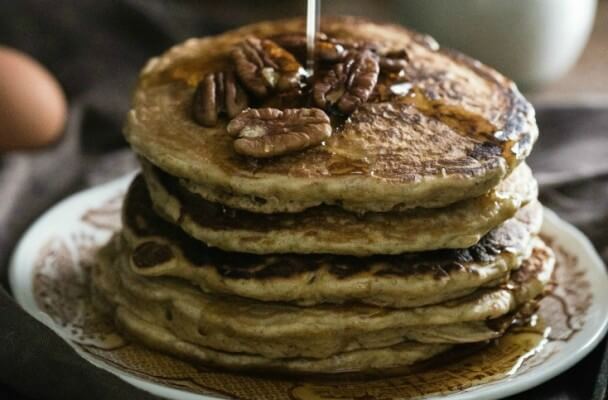
Quinoa Pancakes Recipe
Pancakes are a classic, but the right mix makes all the difference when crafting the ideal flapjack. Quinoa as a base creates a cunning blend of nutrition and savor in the base of this scrumptious stackable.
Ingredients: Quinoa, whole wheat pastry flour (or brown rice flour for gluten-free cakes), eggs, milk, maple syrup or honey, raw pecans, baking powder, vanilla extract, salt.
Total Time: 15 minutes
| Yield: 7 pancakes
Healthy Breakfast Foods & Ingredients
The following products act as a great way of adding needed nutrients to your morning meal. Simply select your favorite foods and keep them on-hand in your pantry to ensure you always have a healthy way to start the day.
Healthy Eating
- Healthy Snacks
- Healthy Highlights
- 5 Uses for Cacao Powder
- 5 Ways to Eat Farro
- 6 Best Gluten-Free Foods
- Alcohol and the Body
- Almond Flour Recipes
- Anti-Aging Superfoods
- Beat the Afternoon Slump
- Benefits of a Plant-Based Diet
- Benefits of Baobab
- Benefits of Cashews
- Benefits of Coconut Oil for Hair
- Benefits of Coconuts
- Benefits of Dates
- Benefits of Fenugreek
- Benefits of Garcinia Cambogia
- Benefits of Goji Berries
- Benefits of Kale Chips
- Benefits of Monk Fruit Sweetener
- Benefits of Peanuts
- Benefits of Pecans
- Benefits of Pistachios
- Benefits of Pumpkin Seeds
- Benefits of Spelt Flour
- Benefits of Steel Cut Oats
- Benefits of Sunflower Seeds
- Benefits of Tiger Nuts
- Benefits of Turmeric
- Benefits of Walnuts
- Benefits of Wheatgrass
- Best Food Fads
- Cacao vs Cocoa
- Caffeine-Free Energy Foods
- Chocolate That's Good for You
- Diet vs. Exercise
- Fat Burning Foods
- Food Myths Debunked
- Foods for Bone Density
- Foods for Colon Health
- Foods for Healthy Hair
- Foods for Healthy Skin
- Foods to Help Sleep
- Foods to Reduce Stress
- Green Tea Benefits
- Healthy Baking Flours
- Heart Healthy Habits
- High Protein Health Risks
- How to Boost Your Metabolism
- How to Lose Weight While Aging
- How to Throw a Vegan BBQ
- Kaniwa vs Quinoa
- Little Health Foods
- Low-Carb: Fad or Friend?
- Making Healthier Desserts
- Mediterranean Diet Meal Plan
- Natural Beauty Products
- Nuts for Weight Loss
- Preparing Vegan Meals
- Preventing Muscle Degeneration
- Rare Superfoods
- Reduce Sugar Intake
- Save Time By Going Vegan
- Smarter Snack Swaps
- Smoothie Ingredients
- Soy Protein vs Whey Protein
- Starting a Plant-Based Diet
- Steel Cut vs Rolled Oats
- Sugar Substitutes
- Vegan Proteins
- Vegan Substitutions for Fall Recipes
- Why Go Vegan
- Healthy Recipes
- Sports Nutrition
- Nutrition and Special Diets
- 21 Day Fix
- 5 Popular Diet Similarities
- Alkaline Diet
- Anti-Inflammatory Diet
- Calorie Counting
- Carb Cycling Diet
- Celiac Disease
- Cholesterol
- Clean Eating
- Crohn's Disease
- DASH Diet
- Detox Diet
- Diabetes
- Diabetes Diet
- Diet Pill Dangers
- Fat Burning Foods
- Gluten-free Diet
- Glycemic Index
- Heart Health
- High Blood Pressure Diet
- High Fiber Foods
- How to Eat Healthy
- How to Lower Blood Pressure
- Hypertension
- IBS Diet
- Ketogenic Diet
- Liquid Diet
- Low GI Foods
- Low-Carb Diet and Foods
- Low-Fat High-Carb Diet
- Mediterranean Diet
- Mediterranean Diet Foods
- Military Diet
- Nutrition Labels Explained
- Paleo Diet
- Raw Food Diet
- Superfoods
- Sustainable Weight Loss
- Thrive Diet
- Vegan Diet
- Vegetarian Diet
- Weight Loss Shakes
- Whole30
- Vitamins, Minerals & Nutrients

